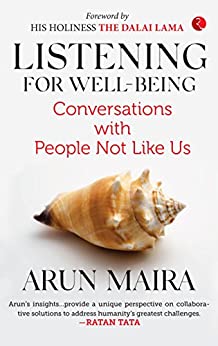‘Listening for Well-Being: Conversations with People Not Like Us’

India’s history is a composition of many histories. Any attempt to impose a single vision of India’s history is a fool’s game. It will create divisions within people, as evident from the recent efforts to rewrite Indian history. A shared, aspirational vision of what India must become is necessary to align the energies of all Indians in shaping their future. A foundational element of this vision of India has to be that India is a conglomeration of many diverse people with different histories. Ultimately, the idea of India must be what a billion Indians think it is. All of them will not see India in the same way. Their lenses are shaped by their personal histories. Yet all must respect other Indians as being just as much Indian as themselves.
A strong Indian State must be formed around a vision of the future, as the US was, and not around a religion and selective history. India’s Prime Minister says that the Constitution is his God. For all Indians too, their Constitution must be the guide to the conduct of the State, and not their version of India’s history.
While all Indians cannot have the same lenses, they must acknowledge that other Indians also have a right to their perspectives of India. Despite these different lenses, there must be something common in their views of India for it to become their collective vision of our India. Indians must discover the highest common factors in their multiple perspectives and aspirations. Therefore, whatever be India’s past, those within India’s present borders must listen to each other deeply to understand who we are, and to shape our future together.
The central question of our times is, ‘How on Earth can we live together?’ How can we Indians live harmoniously together and with our Mother Earth? How can people of all countries live harmoniously together and with their one shared Earth?
Listening to others is not easy when what they say seems so wrong. It may seem wrong because others see the same reality through different lenses. Like the blind men around the elephant, each of us is convinced that what we see is the truth, which it may be. But it is not the whole truth.
***

Listening is a simple idea. Everyone—rich or poor, powerful or weak, educated or uneducated—can listen to each other. In Listening for Well-Being, Arun Maira shows us ways to use the power of listening. He analyses the causes for the decline in listening and proposes solutions to increase its depth in private and public discourse. Drawing from his extensive experience as a leading strategist, Maira emphasizes that by listening deeply, especially to people who are not like us, we can create a more inclusive, just, harmonious and sustainable world for everyone.

